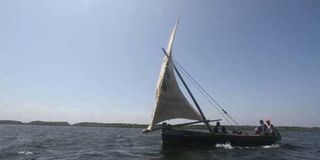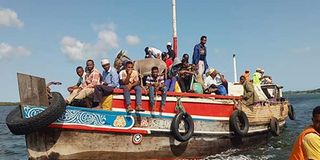Daring death: How poverty is sending fishermen to rough seas

People in a boat in Indian Ocean waters.
Despite frequent marine accidents and loss of lives involving artisanal fishermen in Lamu County in recent times, many vow they will not quit the business, because it is their only source of income.
“We can’t wait for the windy season or any other situation to subside before venturing into the sea. Fishing is our only source of livelihood and nothing else,” says Lamu Island Beach Management Unit chair Abubakar Twalib.
Mr Twalib has been in the fishing industry for 12 years.
He told Nation.Africa that fishers frequently ignore warnings from the meteorological department and the Kenya Marine Agency (KMA) about weather conditions and work in rough seas, risking death, but they need to make a living.
“Fishing is our sole income earner. We can’t lose even a single minute in the name of waiting for the sea to calm. What will our children, wives and siblings eat? We are poor and the only saviour is the sea,” he says.
Mohamed Ali, a fisherman in Faza with over 20 years of experience at sea, describes artisanal fishing as costly and dangerous.
The father of nine discloses that he has survived more than 10 dhow accidents in the open sea but still has not thought about quitting the trade.
He has kept the faith that fishing will change his life in the end no matter how many years it will take.
He remembers his worst incident, in 2009.
“We were fishing in the Ndau channel in the deep seas. There was a sudden change of weather and our dhow was overpowered by strong winds and capsized,” he says.
“We lost everything. There were three of us and I was the only fisherman who survived that accident. You can imagine how bad this venture is,” he says.
The venture is not meant for the faint-hearted, as one must arm themselves with all the confidence and calm.
Abdallah Bakari, a fisherman for the past 10 years, says the major worry is whether he can survive in the sea when the weather suddenly turns hostile.
But he says one should always be prepared to face such eventualities at sea.

Kenya Navy officers rescuing fishermen whose dhows capsized at Mlango wa Bomani in Kiunga, Lamu East. PHOTO | KALUME KAZUNGU | NATION MEDIA GROUP
He cites the unpredictable weather as one of the key reasons behind the ever-growing boat accidents, injuries and deaths in Lamu.
He notes that not all accidents happen because of ignorance of weather forecasts.
“Before starting our journeys to the deep sea or fishing ventures in open seas, we sometimes check all weather-related information either on the website or the relevant offices in Lamu for our safety,” he says.
“Sometimes the weather changes unexpectedly over the sea and winds become stronger, waves rise up to an extent of toppling dhows. We can’t blame anyone when we find ourselves in such scenarios. We live by the grace of God.”
Lamu Beach Management Unit (BMU) network chair Mohamed Somo cites government negligence as a key contributor to fishermen’s woes in the region.
Before projects such as the Lamu port (Lapsset) were established, fishermen enjoyed working in the safety of shallow waters.
The dredging activities that took place at the Lamu port site in Kililana have, however, destroyed traditional fishing grounds and fishing channels, leaving local fishermen with no option but to risk their lives in the dangerous deep ocean as they seek to improve their catches.
“Even when the ocean is rough, that hasn’t hindered us from venturing into the open seas. We have lost hope fishing in shallow waters. These fishing grounds were destroyed by Lapsset. Unfortunately, the government has neglected us,” he says.
“They have failed to speed up the compensation process and fishermen can’t stay hungry as they wait for the cash. That’s why we’re daring death by sending ourselves to the deep seas while trying to make a living.”
The increase in fishing boat accidents in Lamu is also attributed to fishers’ use of locally made wooden canoes and other traditional gear.
Omar Mbwana, a fisherman in the far-flung island of Kiwayu in Lamu East, says the only way to guarantee their safety is for the government to consider buying them modern boats and diving kits so they can navigate stormy seas better rather than issuing alerts.
“It’s not an issue of just adhering to weather advisories. More needs to be done. We always get early warnings of upcoming storms and high tidal waves, especially from KMA, but we can’t stop going fishing. What will we eat?” he says.
The fishermen also believe engine-powered vessels will make their trade easier, more profitable and even help revive their livelihoods weakened by the Covid-19 crisis and climate change.
Contacted for comment, Lamu County Director for Meteorological Services Edward Ngure warned sailors, fishermen and sea travellers about strong winds now ravaging the Indian Ocean.
Mr Ngure advised sea users to watch out for weather updates from the office so as to know when it is safe to go into the ocean.

Sailors on a boat in Lamu. Two people have been reported missing after a cargo dhow they were travelling in capsized at Mlango wa Pate, a few kilometres from the Manda Bruno Channel in Lamu East on Sunday. PHOTO | KALUME KAZUNGU | NATION MEDIA GROUP
He insisted that many boat accidents result from failure by sea users to heed weather forecasts.
He says his office does what it can to ensure sea users are safe.
The office always advises fishermen to avoid notorious danger channels like Mkanda, Manda Bruno, Mlango wa Tanu, Mlango wa Bomani, Mlango wa Alii, Mlango wa Kipungani and Shella, especially during windy seasons.
These channels always experience extremely high tides that sometimes render them impassable.
“We have formed WhatsApp groups and added all leaders of the various BMUs where we provide daily weather updates,” Mr Ngure said.
“Such updates are then disseminated to the various members of the BMUs. It’s easier that way. All in all, let’s respect such warnings for our own good.”
In a span of one week, Lamu has witnessed at least five boat accidents, the most recent happening on Monday, when three fishermen were rescued after their dhow capsized in the Mlango wa Shella channel.
The three - Shee Mohammed, Fuad Mohamed and Ali Mohammed – were admitted at King Fahad County Hospital in Lamu town.
Lamu fishermen venturing into the Indian Ocean.
On Friday last week, four fishermen were rescued after their boat capsized in the Ziwani channel in Kiunga, Lamu East.
They included Shee Issa, Arafat Titi, Mahmoud Mohamed and Mohamed Dili.
The accidents came as the fate of two fishermen was still unknown after their boat capsized in Tenewi two weeks ago.
The two were among five fishermen from Ngomeni in Kilifi County who had come to Lamu when their boat was overpowered by strong winds and tides and capsized.
The other three were rescued.
Earlier this month three fishermen - Aboud Obbo, Mohamed Obbo and Aboud Mzee - were rescued after their boat capsized in Pezali, near Shanga-Rubu island in Lamu East.
In July this year, six Tanzanian sailors and one Indian were rescued by the Kenya Navy and the Kenya Coast Guard Service after their boat capsized off Shanga island in Lamu East.
They were heading to Kismayu, Somalia, from Dar es Salaam, Tanzania, to collect a consignment of scrap metal when their boat, MV Al-Feroz, capsized and sank at around 10pm owing to rough seas.




